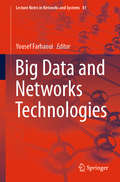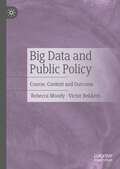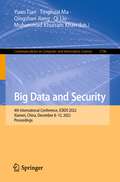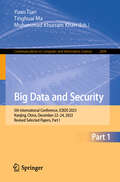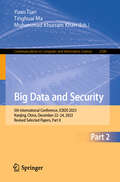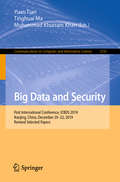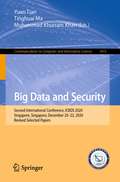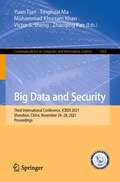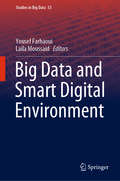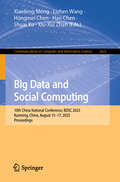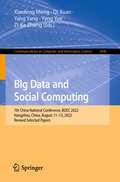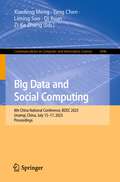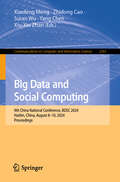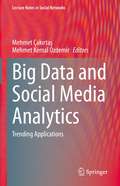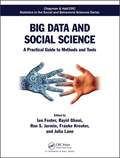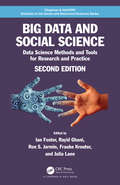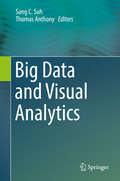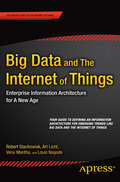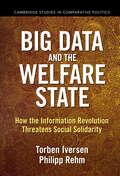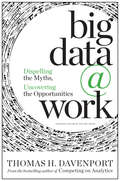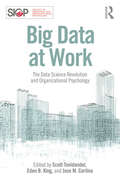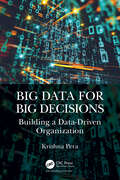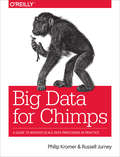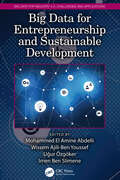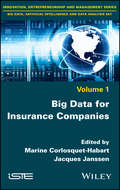- Table View
- List View
Big Data and Networks Technologies (Lecture Notes in Networks and Systems #81)
by Yousef FarhaouiThis book reviews the state of the art in big data analysis and networks technologies. It addresses a range of issues that pertain to: signal processing, probability models, machine learning, data mining, databases, data engineering, pattern recognition, visualization, predictive analytics, data warehousing, data compression, computer programming, smart cities, networks technologies, etc. Data is becoming an increasingly decisive resource in modern societies, economies, and governmental organizations. In turn, data science inspires novel techniques and theories drawn from mathematics, statistics, information theory, computer science, and the social sciences. All papers presented here are the product of extensive field research involving applications and techniques related to data analysis in general, and to big data and networks technologies in particular. Given its scope, the book will appeal to advanced undergraduate and graduate students, postdoctoral researchers, lecturers and industrial researchers, as well general readers interested in big data analysis and networks technologies.
Big Data and Public Policy: Course, Content and Outcome
by Victor Bekkers Rebecca MoodyThis book provides a comprehensive overview of how the course, content and outcome of policy making is affected by big data. It scrutinises the notion that big and open data makes policymaking a more rational process, in which policy makers are able to predict, assess and evaluate societal problems. It also examines how policy makers deal with big data, the problems and limitations they face, and how big data shapes policymaking on the ground. The book considers big data from various perspectives, not just the political, but also the technological, legal, institutional and ethical dimensions. The potential of big data use in the public sector is also assessed, as well as the risks and dangers this might pose. Through several extended case studies, it demonstrates the dynamics of big data and public policy. Offering a holistic approach to the study of big data, this book will appeal to students and scholars of public policy, public administration and data science, as well as those interested in governance and politics.
Big Data and Security: 4th International Conference, ICBDS 2022, Xiamen, China, December 8–12, 2022, Proceedings (Communications in Computer and Information Science #1796)
by Tinghuai Ma Muhammad Khurram Khan Qi Liu Yuan Tian Qingshan JiangThis book constitutes the refereed proceedings of the 4th International Conference on Big Data and Security, ICBDS 2022, held in Xiamen, China, during December 8–12, 2022.The 51 full papers and 3 short papers included in this book were carefully reviewed and selected from 211 submissions. They were organized in topical sections as follows: answer set programming; big data and new method; intelligence and machine learning security; data technology and network security; sybersecurity and privacy; IoT security.
Big Data and Security: 5th International Conference, ICBDS 2023, Nanjing, China, December 22–24, 2023, Revised Selected Papers, Part I (Communications in Computer and Information Science #2099)
by Tinghuai Ma Muhammad Khurram Khan Yuan TianThe two-volume set constitutes the refereed proceedings of the 5th International Conference on Big Data and Security, ICBDS 2023, held in Nanjing, China, during December 22–24, 2023. The 35 full papers and 1 short paper were carefully reviewed and selected from 161 submissions. They are organized in topical sections as follows: Part One: Big Data & New Method and Artificial Intelligence & Machine Learning Part Two: Data Technology & Network Security and IoT Security & Privacy Protection.
Big Data and Security: 5th International Conference, ICBDS 2023, Nanjing, China, December 22–24, 2023, Revised Selected Papers, Part II (Communications in Computer and Information Science #2100)
by Tinghuai Ma Muhammad Khurram Khan Yuan TianThe two-volume set constitutes the refereed proceedings of the 5th International Conference on Big Data and Security, ICBDS 2023, held in Nanjing, China, during December 22–24, 2023. The 35 full papers and 1 short paper were carefully reviewed and selected from 161 submissions. They are organized in topical sections as follows: Part One: Big Data & New Method and Artificial Intelligence & Machine Learning Part Two: Data Technology & Network Security and IoT Security & Privacy Protection.
Big Data and Security: First International Conference, ICBDS 2019, Nanjing, China, December 20–22, 2019, Revised Selected Papers (Communications in Computer and Information Science #1210)
by Tinghuai Ma Muhammad Khurram Khan Yuan TianThis book constitutes the refereed proceedings of the First International Conference on Big Data and Security, ICBDS 2019, held in Nanjing, China, in December 2019. The 37 revised full papers and 12 short papers were carefully reviewed and selected out of 251 submissions. The papers included in this book cover topics in cybersecurity & privacy, big data, blockchain & internet of things, security in cloud and fog computing, and artificial intelligence/ machine learning security.
Big Data and Security: Second International Conference, ICBDS 2020, Singapore, Singapore, December 20–22, 2020, Revised Selected Papers (Communications in Computer and Information Science #1415)
by Tinghuai Ma Muhammad Khurram Khan Yuan TianThis book constitutes the refereed proceedings of the Second International Conference on Big Data and Security, ICBDS 2020, held in Singapore, Singapore, in December 2020.The 44 revised full papers and 8 short papers were carefully reviewed and selected out of 153 submissions. The papers included in this book are orfanized according to the topical sections on cybersecurity and privacy, big data, blockchain and internet of things, and artificial intelligence/ machine learning security.
Big Data and Security: Third International Conference, ICBDS 2021, Shenzhen, China, November 26–28, 2021, Proceedings (Communications in Computer and Information Science #1563)
by Tinghuai Ma Muhammad Khurram Khan Zhaoqing Pan Yuan Tian Victor S. ShengThis book constitutes the refereed proceedings of the Third International Conference on Big Data and Security, ICBDS 2021, held in Shenzhen, China, in November 2021The 46 revised full papers and 13 short papers were carefully reviewed and selected out of 221 submissions. The papers included in this volume are organized according to the topical sections on cybersecurity and privacy; big data; blockchain and internet of things, and artificial intelligence/ machine learning security.
Big Data and Smart Digital Environment (Studies in Big Data #53)
by Yousef Farhaoui Laila MoussaidThis book reviews the state of the art of big data analysis and smart city. It includes issues which pertain to signal processing, probability models, machine learning, data mining, database, data engineering, pattern recognition, visualisation, predictive analytics, data warehousing, data compression, computer programming, smart city, etc. Data is becoming an increasingly decisive resource in modern societies, economies, and governmental organizations. Data science inspires novel techniques and theories drawn from mathematics, statistics, information theory, computer science, and social science. Papers in this book were the outcome of research conducted in this field of study. The latter makes use of applications and techniques related to data analysis in general and big data and smart city in particular. The book appeals to advanced undergraduate and graduate students, postdoctoral researchers, lecturers and industrial researchers, as well as anyone interested in big data analysis and smart city.
Big Data and Social Computing: 10th China National Conference, BDSC 2025, Kunming, China, August 15–17, 2025, Proceedings (Communications in Computer and Information Science #2622)
by Xiaofeng Meng Lizhen Wang Hao Chen Xiu-Xiu Zhan Hongmei Chen Shuai XuThis book constitutes the refereed proceedings of the 10th China National Conference on Big Data and Social Computing, BDSC 2025, held in Kunming, China, during August 15–17, 2025. The 40 full papers included in this book were carefully reviewed and selected from 140 submissions. They were organized in topical sections as follows: Digital Society Construction and Governance; Modelling and Simulation of Social Systems; Internet Intelligent Algorithm Governance; Social Network and Group Behavior; Innovation, Risks, and Security of Large Language Models; Artificial Intelligence and Cognitive Science; Applications of Large Language Models in Societal Contexts and Social Geography and Urban Computing.
Big Data and Social Computing: 7th China National Conference, BDSC 2022, Hangzhou, China, August 11-13, 2022, Revised Selected Papers (Communications in Computer and Information Science #1640)
by Yang Yang Xiaofeng Meng Yang Yue Qi Xuan Zi-Ke ZhangThis book constitutes refereed proceedings of the 7th China National Conference on Big Data and Social Computing, BDSC 2022, held in Hangzhou, China, from August 11-13, 2022The 24 full papers and 2 short papers presented in this volume were carefully reviewed and selected from a total of 99 submissions. The papers in the volume are organised according to the following topical headings: urban computing and social governance; artificial intelligence and cognitive science; social network and group behavior; digital society and public security; digital government and public big data
Big Data and Social Computing: 8th China National Conference, BDSC 2023, Urumqi, China, July 15–17, 2023, Proceedings (Communications in Computer and Information Science #1846)
by Xiaofeng Meng Yang Chen Qi Xuan Zi-Ke Zhang Liming SuoThis book constitutes refereed proceedings of the 8th China National Conference on Big Data and Social Computing, BDSC 2023, held in Urumqi, China, from July 15–17, 2023.The 23 full papers and 3 short papers presented in this volume were carefully reviewed and selected from a total of 141 submissions. The papers in the volume are organized according to the following topical headings: Digital Technology and Sustainable Development; Social Network and Group Behavior; Digital infrastructure and the Intelligent Society; Digital Society and Public Security; Artificial Intelligence and Cognitive Science; and Internet Intelligent Algorithm Governance.
Big Data and Social Computing: 9th China National Conference, BDSC 2024, Harbin, China, August 8–10, 2024, Proceedings (Communications in Computer and Information Science #2161)
by Xiaofeng Meng Yang Chen Zhidong Cao Suran Wu Xiu-Xiu ZhanThis book constitutes the refereed proceedings of the 9th China National Conference on Big Data and Social Computing, BDSC 2024, held in Harbin, China, during August 8–10, 2024. The 28 full papers presented in this volume were carefully reviewed and selected from a total of 141 submissions. The papers in the volume are organized according to the following topics: digital society and public security; modelling and simulation of social systems; internet intelligent algorithm governance; social network and group behavior; innovation, risks, and network security of large language models; and artificial intelligence and cognitive science.
Big Data and Social Media Analytics
by Mehmet Çakırtaş Mehmet Kemal OzdemirThis edited book provides techniques which address various aspects of big data collection and analysis from social media platforms and beyond. It covers efficient compression of large networks, link prediction in hashtag graphs, visual exploration of social media data, identifying motifs in multivariate data, social media surveillance to enhance search and rescue missions, recommenders for collaborative filtering and safe travel plans to high risk destinations, analysis of cyber influence campaigns on YouTube, impact of location on business rating, bibliographical and co-authorship network analysis, and blog data analytics. All these trending topics form a major part of the state of the art in social media and big data analytics. Thus, this edited book may be considered as a valuable source for readers interested in grasping some of the most recent advancements in this high trending domain.
Big Data and Social Science: A Practical Guide to Methods and Tools
by Frauke Kreuter Julia Lane Ian Foster Rayid Ghani Ron S. JarminBig Data and Social Science: A Practical Guide to Methods and Tools shows how to apply data science to real-world problems in both research and the practice. The book provides practical guidance on combining methods and tools from computer science, statistics, and social science. This concrete approach is illustrated throughout using an important national problem, the quantitative study of innovation. The text draws on the expertise of prominent leaders in statistics, the social sciences, data science, and computer science to teach students how to use modern social science research principles as well as the best analytical and computational tools. It uses a real-world challenge to introduce how these tools are used to identify and capture appropriate data, apply data science models and tools to that data, and recognize and respond to data errors and limitations.
Big Data and Social Science: Data Science Methods and Tools for Research and Practice (Chapman & Hall/CRC Statistics in the Social and Behavioral Sciences)
by Ian Foster, Rayid Ghani, Ron S. Jarmin, Frauke Kreuter and Julia LaneBig Data and Social Science: Data Science Methods and Tools for Research and Practice, Second Edition shows how to apply data science to real-world problems, covering all stages of a data-intensive social science or policy project. Prominent leaders in the social sciences, statistics, and computer science as well as the field of data science provide a unique perspective on how to apply modern social science research principles and current analytical and computational tools. The text teaches you how to identify and collect appropriate data, apply data science methods and tools to the data, and recognize and respond to data errors, biases, and limitations. Features: Takes an accessible, hands-on approach to handling new types of data in the social sciences Presents the key data science tools in a non-intimidating way to both social and data scientists while keeping the focus on research questions and purposes Illustrates social science and data science principles through real-world problems Links computer science concepts to practical social science research Promotes good scientific practice Provides freely available workbooks with data, code, and practical programming exercises, through Binder and GitHub New to the Second Edition: Increased use of examples from different areas of social sciences New chapter on dealing with Bias and Fairness in Machine Learning models Expanded chapters focusing on Machine Learning and Text Analysis Revamped hands-on Jupyter notebooks to reinforce concepts covered in each chapter This classroom-tested book fills a major gap in graduate- and professional-level data science and social science education. It can be used to train a new generation of social data scientists to tackle real-world problems and improve the skills and competencies of applied social scientists and public policy practitioners. It empowers you to use the massive and rapidly growing amounts of available data to interpret economic and social activities in a scientific and rigorous manner.
Big Data and Visual Analytics
by Sang C. Suh Thomas AnthonyThis book provides users with cutting edge methods and technologies in the area of big data and visual analytics, as well as an insight to the big data and data analytics research conducted by world-renowned researchers in this field. The authors present comprehensive educational resources on big data and visual analytics covering state-of-the art techniques on data analytics, data and information visualization, and visual analytics. Each chapter covers specific topics related to big data and data analytics as virtual data machine, security of big data, big data applications, high performance computing cluster, and big data implementation techniques. Every chapter includes a description of an unique contribution to the area of big data and visual analytics. This book is a valuable resource for researchers and professionals working in the area of big data, data analytics, and information visualization. Advanced-level students studying computer science will also find this book helpful as a secondary textbook or reference.
Big Data and the Internet of Things: Enterprise Information Architecture for A New Age
by Robert Stackowiak Art Licht Venu Mantha Louis NagodeEnterprise Information Architecture for a New Age: Big Data and The Internet of Things, provides guidance in designing an information architecture to accommodate increasingly large amounts of data, massively large amounts of data, not only from traditional sources, but also from novel sources such everyday objects that are fast becoming wired into global Internet. No business can afford to be caught out by missing the value to be mined from the increasingly large amounts of available data generated by everyday devices. The text provides background as to how analytical solutions and enterprise architecture methodologies and concepts have evolved (including the roles of data warehouses, business intelligence tools, predictive analytics, data discovery, Big Data, and the impact of the Internet of Things). Then you're taken through a series of steps by which to define a future state architecture and create a plan for how to reach that future state. Enterprise Information Architecture for a New Age: Big Data and The Internet of Things helps you gain an understanding of the following: Implications of Big Data from a variety of new data sources (including data from sensors that are part of the Internet of Things) upon an information architecture How establishing a vision for data usage by defining a roadmap that aligns IT with line-of-business needs is a key early step The importance and details of taking a step-by-step approach when dealing with shifting business challenges and changing technology capabilities How to mitigate risk when evaluating existing infrastructure and designing and deploying new infrastructure Enterprise Information Architecture for a New Age: Big Data and The Internet of Things combines practical advice with technical considerations. Author Robert Stackowiak and his team are recognized worldwide for their expertise in large data solutions, including analytics. Don't miss your chance to read this book and gain the benefit of their advice as you look forward in thinking through your own choices and designing your own architecture to accommodate the burgeoning explosion in data that can be analyzed and converted into valuable information to drive your business forward toward success. What you'll learn Grasp the big picture of the trend toward enterprise analytic solutions Define and validate a vision for a future state within your organization Ensure that your vision is aligned with line-of-business needs Understand available skills and align your IT infrastructure to the new vision Address Data Governance, Security, Data Quality, and other important attributes Implement the new vision while dealing successfully with changes in scope Who this book is for Enterprise Information Architecture for a New Age: Big Data and The Internet of Things for a New Age is most targeted at Enterprise Architects in an organization (commercial company, public sector agency, systems integrator), but will also appeal to IT managers, CIOs, line-of-business IT executives, and others seeking to understand how to define enterprise analytics architectures and justify projects that are focused in this area. Table of Contents Introduction Chapter 1. Big Data Solutions and Internet of Things Chapter 2. Evaluating the Art of the Possible Chapter 3. Business Drivers behind Big Data and Internet of Things Chapter 4. Business Information Mapping Chapter 5. Skills for Big Data and Internet of Things Chapter 6. Architecture for Big Data and Internet of Things Chapter 7. Planning Big Data and Internet of Things Projects Chapter 8. Big Data and Internet of Things Implementation Chapter 9. Appendix A Chapter 10. Appendix B
Big Data and the Welfare State: How the Information Revolution Threatens Social Solidarity (Cambridge Studies in Comparative Politics)
by Torben Iversen Philipp RehmA core principle of the welfare state is that everyone pays taxes or contributions in exchange for universal insurance against social risks such as sickness, old age, unemployment, and plain bad luck. This solidarity principle assumes that everyone is a member of a single national insurance pool, and it is commonly explained by poor and asymmetric information, which undermines markets and creates the perception that we are all in the same boat. Living in the midst of an information revolution, this is no longer a satisfactory approach. This book explores, theoretically and empirically, the consequences of 'big data' for the politics of social protection. Torben Iversen and Philipp Rehm argue that more and better data polarize preferences over public insurance and often segment social insurance into smaller, more homogenous, and less redistributive pools, using cases studies of health and unemployment insurance and statistical analyses of life insurance, credit markets, and public opinion.
Big Data at Work
by Thomas H. DavenportGo ahead, be skeptical about big data. The author was-at first.When the term "big data" first came on the scene, bestselling author Tom Davenport (Competing on Analytics, Analytics at Work) thought it was just another example of technology hype. But his research in the years that followed changed his mind.Now, in clear, conversational language, Davenport explains what big data means-and why everyone in business needs to know about it. Big Data at Work covers all the bases: what big data means from a technical, consumer, and management perspective; what its opportunities and costs are; where it can have real business impact; and which aspects of this hot topic have been oversold.This book will help you understand: Why big data is important to you and your organization What technology you need to manage it How big data could change your job, your company, and your industry How to hire, rent, or develop the kinds of people who make big data work The key success factors in implementing any big data project How big data is leading to a new approach to managing analyticsWith dozens of company examples, including UPS, GE, Amazon, United Healthcare, Citigroup, and many others, this book will help you seize all opportunities-from improving decisions, products, and services to strengthening customer relationships. It will show you how to put big data to work in your own organization so that you too can harness the power of this ever-evolving new resource.
Big Data at Work: The Data Science Revolution and Organizational Psychology (SIOP Organizational Frontiers Series)
by Scott Tonidandel, Eden B. King, and Jose M. CortinaThe amount of data in our world has been exploding, and analyzing large data sets—so called big data—will become a key basis of competition in business. Statisticians and researchers will be updating their analytic approaches, methods and research to meet the demands created by the availability of big data. The goal of this book is to show how advances in data science have the ability to fundamentally influence and improve organizational science and practice. This book is primarily designed for researchers and advanced undergraduate and graduate students in psychology, management and statistics.
Big Data for Big Decisions: Building a Data-Driven Organization
by Krishna PeraBuilding a data-driven organization (DDO) is an enterprise-wide initiative that may consume and lock up resources for the long term. Understandably, any organization considering such an initiative would insist on a roadmap and business case to be prepared and evaluated prior to approval. This book presents a step-by-step methodology in order to create a roadmap and business case, and provides a narration of the constraints and experiences of managers who have attempted the setting up of DDOs. The emphasis is on the big decisions – the key decisions that influence 90% of business outcomes – starting from decision first and reengineering the data to the decisions process-chain and data governance, so as to ensure the right data are available at the right time, every time. Investing in artificial intelligence and data-driven decision making are now being considered a survival necessity for organizations to stay competitive. While every enterprise aspires to become 100% data-driven and every Chief Information Officer (CIO) has a budget, Gartner estimates over 80% of all analytics projects fail to deliver intended value. Most CIOs think a data-driven organization is a distant dream, especially while they are still struggling to explain the value from analytics. They know a few isolated successes, or a one-time leveraging of big data for decision making does not make an organization data-driven. As of now, there is no precise definition for data-driven organization or what qualifies an organization to call itself data-driven. Given the hype in the market for big data, analytics and AI, every CIO has a budget for analytics, but very little clarity on where to begin or how to choose and prioritize the analytics projects. Most end up investing in a visualization platform like Tableau or QlikView, which in essence is an improved version of their BI dashboard that the organization had invested into not too long ago. The most important stakeholders, the decision-makers, are rarely kept in the loop while choosing analytics projects. This book provides a fail-safe methodology for assured success in deriving intended value from investments into analytics. It is a practitioners’ handbook for creating a step-by-step transformational roadmap prioritizing the big data for the big decisions, the 10% of decisions that influence 90% of business outcomes, and delivering material improvements in the quality of decisions, as well as measurable value from analytics investments. The acid test for a data-driven organization is when all the big decisions, especially top-level strategic decisions, are taken based on data and not on the collective gut feeling of the decision makers in the organization.
Big Data for Chimps: A Guide to Massive-Scale Data Processing in Practice
by Russell Jurney Philip Flip KromerFinding patterns in massive event streams can be difficult, but learning how to find them doesn’t have to be. This unique hands-on guide shows you how to solve this and many other problems in large-scale data processing with simple, fun, and elegant tools that leverage Apache Hadoop. You’ll gain a practical, actionable view of big data by working with real data and real problems.Perfect for beginners, this book’s approach will also appeal to experienced practitioners who want to brush up on their skills. Part I explains how Hadoop and MapReduce work, while Part II covers many analytic patterns you can use to process any data. As you work through several exercises, you’ll also learn how to use Apache Pig to process data.Learn the necessary mechanics of working with Hadoop, including how data and computation move around the clusterDive into map/reduce mechanics and build your first map/reduce job in PythonUnderstand how to run chains of map/reduce jobs in the form of Pig scriptsUse a real-world dataset—baseball performance statistics—throughout the bookWork with examples of several analytic patterns, and learn when and where you might use them
Big Data for Entrepreneurship and Sustainable Development (Big Data for Industry 4.0)
by Imen Ben Slimene Uğur Özgöker Mohammed El Amine Abdelli Wissem Ajili-Ben YoussefThis book provides insight for researchers and decision-makers on the application of data in the entrepreneurship and sustainable development sector. This book covers how Big Data for Industry 4.0 and entrepreneurship are effective in resolving business, social, and economic problems. The book discusses how entrepreneurs use Big Data to cut costs and minimize the waste of time. It offers how using Big Data can increase efficiency, enables the studying of competitors, can improve the pricing of products, increase sales and loyalty, and can ensure the right people are hired. The book presents how decision-makers can make use of Big Data to resolve economic and social problems. Analyze the development of the economy and enhance the business climate. This book is for researchers, PhD students, and entrepreneurs and can also be of interest for transforming governments as well as businesses.
Big Data for Insurance Companies
by Jacques Janssen Marine Corlosquet-HabartThis book will be a “must” for people who want good knowledge of big data concepts and their applications in the real world, particularly in the field of insurance. It will be useful to people working in finance and to masters students using big data tools. The authors present the bases of big data: data analysis methods, learning processes, application to insurance and position within the insurance market. Individual chapters a will be written by well-known authors in this field.
